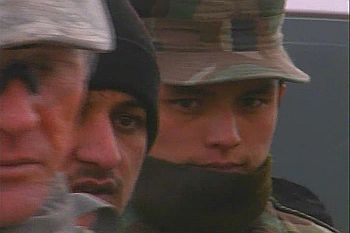
Publisher:
Bonnie King
CONTACT:
Newsroom@Salem-news.com
Advertising:
Adsales@Salem-news.com

~Truth~
~Justice~
~Peace~
TJP
Jan-09-2012 13:59

 TweetFollow @OregonNews
TweetFollow @OregonNews
How to Deal with Legacies of Conflict in Afghanistan?
Salem-News.comCertain initiatives—whether locally-driven or at the national level—have the potential to provide a measure of comfort to conflict victims while paving the way for a more enduring peace.
 Faces of Afghan soldiers in Kabul. Salem-News.com photo by Tim King |
(WASHINGTON D.C.) - There are millions of conflict victims in Afghanistan and the ongoing fighting creates new suffering every day. With a complex and contested wartime history, how can a way forward be found that satisfies victims’ demands for justice and healing while delivering the peace that is so desired.
An AREU research team spent 18 months visiting six communities in Afghanistan to ask this question in the light of local wartime experiences. The project has already resulted in a variety of case studies and the final report has now been released.
It synthesizes the findings from across the research sites in search of broadly acceptable approaches to address the legacies of conflict and support reconciliation in the country. It also examines the political context for transitional justice and reconciliation and considers which policies might need to be changed or adopted.
The research found that many Afghans continue to struggle with the legacies of their wartime experiences. They usually saw peace and justice as complementary, and not as alternatives to each other. Justice was often widely conceived to include processes of recognition and recompense, and not simply criminal trials or punitive measures.
There was a widespread desire for a strong and caring government that could drive a justice process and also negotiate for a peace that would not only end the insurgency, but reconcile Afghanistan’s different groups. However, a widespread pessimism prevailed about the prospect of this occurring in the near future.
In the meantime, certain initiatives—whether locally-driven or at the national level—have the potential to provide a measure of comfort to conflict victims while paving the way for a more enduring peace.
Click here to download the report
 |
 |
 |
 End Israeli apartheid |
Articles for January 8, 2012 | Articles for January 9, 2012 | Articles for January 10, 2012

googlec507860f6901db00.html
Salem-News.com:



Terms of Service | Privacy Policy
All comments and messages are approved by people and self promotional links or unacceptable comments are denied.
[Return to Top]
©2025 Salem-News.com. All opinions expressed in this article are those of the author and do not necessarily reflect those of Salem-News.com.